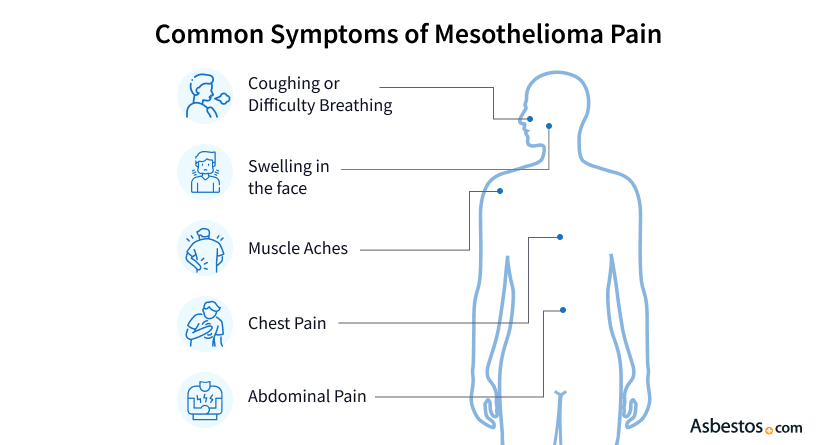Mesothelioma Pain
Mesothelioma pain usually starts in the chest, belly or lower back and can radiate to other parts of the body. It often feels dull at first, but may become sharp and stabbing when tumors or fluid press on nerves or organs.

Types of Mesothelioma Pain
Many patients with mesothelioma experience one or more types of pain as a symptom of their condition. Chronic pain that lasts for several months is common. The type of pain can change with different treatments or during periods of remission or tumor growth.
Chest pain is among the most common types of chronic pain people with pleural mesothelioma experience. It often occurs in the side of the chest.
Mesothelioma Pain Types
- Acute: This pain usually comes on quickly but lasts for a short period. It may be associated with an injury or treatment for mesothelioma.
- Breakthrough: When a spike of pain “breaks through” pain medication, it’s known as breakthrough pain.
- Chronic: Pain that persists for a long time is considered chronic pain. It usually lasts longer than 3 months.
- Diffuse: This generalized pain isn’t limited to a specific area. It can be a sign of nerve damage or result from chemotherapy treatments.
- Dull: Dull pain is usually less intense than sharp pain. It may feel like throbbing or pulsing. It can persist for prolonged periods over a large area of the body.
Acute mesothelioma pain can feel sharp or stabbing. It may come and go as breakthrough pain as your condition progresses. Neuropathic pain is a type of acute pain that results from nerve damage. It may feel burning or shooting.
What Causes Mesothelioma Pain?
Tumors that press on nerves or organs cause most mesothelioma pain. As tumors grow, fluid can build up and worsen pain. As malignant mesothelioma spreads, it can also cause bone and muscle pain. Many people feel back pain, stiff joints or body aches.
People with pleural mesothelioma may feel pain from swelling in the lining around the lungs. Those with peritoneal mesothelioma may feel pain from swelling in the lining of the belly.
Mesothelioma treatments like radiation, chemotherapy and surgery can also cause pain. These treatments may damage healthy tissue or nerves. Some treatments like chemo can cause blood clots. Blood clots in the lungs can lead to sudden, sharp chest pain and require quick medical attention.
Pleural mesothelioma survivor Joanne D. tells us she underwent multiple surgeries and rounds of chemo over the years. She shares, “Most of the time, there was still pain and discomfort.” She says she also experienced fatigue. Despite that, she tells us, “I would say that I had a good quality of life in between surgeries.”

Find the top cancer centers trusted by mesothelioma patients nationwide.
Get Help NowOther Symptoms Mesothelioma Pain Can Cause
Pain is a symptom of mesothelioma that can cause other symptoms. It can also worsen some symptoms. For example, pain can naturally and understandably limit your physical activity. Unfortunately, inactivity can weaken back and core muscles, making it harder for your spine to stay supported. Staying still for long periods can also cause stiffness and reduce blood flow, causing back pain over time.
Effects of Mesothelioma Pain
- Back pain
- Coughing
- Difficulty with physical activities
- Fatigue
- Loss of appetite
- Mood changes
- Sleep disruption
- Swelling
Swelling can cause pain. But pain can also cause swelling. The body can respond to mesothelioma pain with an inflammatory response, which can result in swelling. Similarly, coughing can be painful, but coughing can also be a response to mesothelioma pain. Inflammation of the lining of the lungs causes pain that triggers coughing.
Pain from mesothelioma can make it hard to do everyday tasks and may keep you from staying active. If pain lasts too long or feels too intense, it can lead to anxiety or depression and lower your quality of life. The good news is that pain management and palliative treatments can help reduce symptoms and improve your mental health.

How Tumor Location Affects Mesothelioma Pain Symptoms
The type of mesothelioma pain you may experience often depends on where tumors develop. People with pleural mesothelioma, the most common type of this cancer, often feel pain in the chest, shoulders, lower back or side.
Peritoneal mesothelioma often causes stomach pain. Chest pain is common with pericardial mesothelioma. If mesothelioma tumors spread to other parts of the body or metastasize, it can cause pain in those new areas.
Treating Mesothelioma Pain
Managing mesothelioma pain is part of a comprehensive mesothelioma treatment plan. Many treatments and methods can help. Each mesothelioma survivor experiences pain and responds to pain management differently.
Doctors often treat mesothelioma pain with a combination of medication and physical therapy. Pain blockers and steroids can give short-term relief. Physical therapy can build strength and movement, which may reduce pain. A 2024 study in the journal Cancers shows pulmonary rehab may ease pain from pleural mesothelioma.
Treatments for Mesothelioma Pain
- Chemotherapy
- Complementary approaches
- Mind-body techniques
- Palliative radiation
- Physical therapy
- Pulmonary therapy
- Regional or local anesthesia
- Surgery
Most treatment plans include palliative care, which helps reduce pain. Palliative chemo uses lower-dose medication to shrink tumors, easing pain. Similarly, palliative radiation for pleural mesothelioma can shrink tumors, reducing pain. Palliative surgery involves removing tumors, draining fluid or blocking pain signals.
Some people feel better and improve their quality of life with integrative, complementary or alternative therapies. Breathing exercises, massage or electrical stimulation can support other treatments. Distraction, stress relief and support from others may also help manage pain.
Pain Medication
Both over-the-counter and prescription medications can help manage mesothelioma pain. Doctors often recommend starting with ibuprofen or acetaminophen for mild pain.
For moderate pain, they may add weak opioids, anti-inflammatory drugs, anticonvulsants or skin-numbing creams. Stronger opioids like morphine may treat severe pain.
Patients often ask me how long they’ll experience mesothelioma pain, and I explain it can depend if the cancer is pushing on pain nerve pathways. If their mesothelioma responds to treatment, then their pain may lessen.
Alternative Treatments for Mesothelioma Pain
Many cancer centers and doctors take an integrative medicine approach to mesothelioma treatment plans. This means they combine complementary or alternative therapies with more traditional approaches to help people manage their symptoms like mesothelioma pain.
Alternative Therapies for Mesothelioma Pain
- Acupuncture: Tiny needles are placed in specific spots on the body to help block pain signals.
- Aromatherapy: Scents like lavender or peppermint are used to help with relaxation and comfort.
- Chiropractic care: Spinal adjustments may help reduce nerve irritation, inflammation and pain.
- Massage therapy: A trained massage therapist can help reduce muscle tension and improve circulation.
- Music therapy: Calming music may help ease stress and release the body’s natural pain relievers.
- Relaxation techniques: Deep breathing, guided imagery or meditation may help calm the body and reduce pain.
- Yoga or gentle movement: Light stretching and slow movements may lower stress and reduce pain levels.
While some of these therapies may be offered at your cancer center, it’s a good idea to discuss any new or alternative treatment with your doctor first. Some alternative therapies may not be advised for everyone and could potentially affect other parts of your care. Your doctor can help you choose the safest options for you.
How to Manage Mesothelioma Pain
An important part of managing your mesothelioma pain is maintaining good communication with your doctor. Keeping a journal can help you and your doctor identify things that trigger or worsen pain and what’s effective for you. Documenting side effects of pain medication can also help. Ask your doctor or pharmacist any questions you may have about your pain medications.
Making small changes to your daily routine can also help you reduce mesothelioma pain. If you’re finding sleeping through the night challenging, taking short naps during the day may help. Gentle movement, like walking or stretching, can keep your body flexible and help reduce stiffness.
Eating healthy foods and staying hydrated can also give your body the strength it needs to fight pain. Some people say hobbies, mesothelioma support groups, and spending time with loved ones bring more joy into each day, easing stress and pain.
Registered Nurse Sean Marchese tells us that for those who haven’t found a helpful solution yet, a Patient Advocate can help. He explains, “Their resources can help connect you with a pain management specialist or treatment center with new strategies and techniques to manage pain. Almost all cancer pain can be treated.”
When to See a Doctor for Mesothelioma Pain
You should see a mesothelioma doctor if you have persistent mesothelioma pain, chest pain, a swollen abdomen or a cough that won’t go away. It’s important to manage your symptoms and keep your strength up during treatment.
If you’re experiencing pain, haven’t been diagnosed and suspect you may have mesothelioma, it’s important to speak with a doctor as soon as possible. This is vital if you’ve been exposed to asbestos. Diagnosing mesothelioma early through screening can help you receive treatment sooner and improve your outlook or mesothelioma prognosis.
Common Questions About Mesothelioma Pain
- Can mesothelioma pain be managed without strong painkillers?
-
Yes, mesothelioma pain can sometimes be managed without strong painkillers, especially in the early stages or when pain is mild to moderate. Many patients use a combination of methods to stay comfortable like over-the-counter pain relievers and non-drug therapies.
- What does mesothelioma pain feel like?
-
Mesothelioma pain feels different for everyone, but many people say it usually feels dull and aching, but can become sharp or stabbing. It often starts in the chest, back or abdomen depending on your mesothelioma type. Some describe it as a pressure in the chest, especially when breathing.
Others feel burning or tingling nerve pain in the ribs or shoulders. In the early stage, pain is usually milder and may come and go. In later stages, pain often grows stronger and more constant. People in the late stages often need stronger treatments like prescription medicine or nerve blocks to stay comfortable.
- Why does mesothelioma cause pain in multiple areas?
-
Mesothelioma causes pain in multiple areas because it can spread and put pressure on different parts of the body. Tumors can press on nerves, organs and bones, causing severe pain that may spread to the neck, arms or legs. Pleural effusion or fluid buildup around the lungs or in the abdomen, can also stretch nearby tissue and make breathing or moving painful. In later stages, the cancer may spread to other areas, which leads to more widespread pain.
- How long does mesothelioma pain last?
-
Mesothelioma pain can last for different amounts of time, depending on the type of pain and how the cancer grows. Some people feel short-term pain, while others deal with pain that lasts for months or longer. If the cancer keeps spreading, the pain can stick around and become harder to control, especially in later stages. If your pain gets worse or doesn’t go away, talk to your doctor. They can change your treatment to help you feel better.
- How can caregivers support mesothelioma patients experiencing pain?
-
Caregivers play a big role in helping mesothelioma patients manage pain. They can keep a daily record of the patient’s pain levels, symptoms and how well treatments are working. This helps doctors adjust pain plans faster. They can also remind patients to take pain medicine on time and watch for side effects.
Simple things like adjusting pillows, applying heat or cold packs, or helping with daily tasks can make a big difference. Emotional support also helps ease stress and pain. They can also speak up for the patient during appointments and share updates about pain or side effects. Helping the patient rest, get sleep and try relaxation techniques like deep breathing or meditation can lower pain levels and improve mood.




